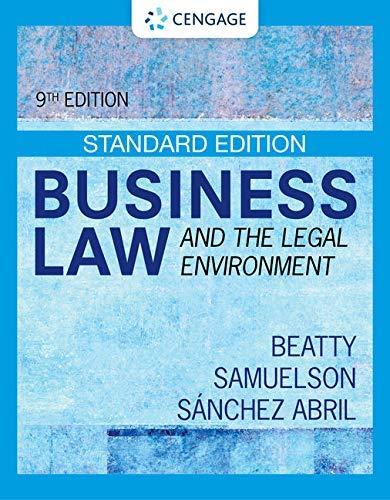Question
1. An indictment is a set of formal charges against a defendant issued by a grand jury. True or false 2. Jeff Reid filed a
1. An indictment is a set of formal charges against a defendant issued by a grand jury.
True or false
2. Jeff Reid filed a lawsuit against his son's school teacher, Janice Robinson. In the lawsuit, Reid requested $1,000 in damages and Robinson's termination of employment. Reid alleged that Robinson's overly strict behavior resulted in his son's poor performance. While the trial court upheld Reid's claim for damages, it denied Robinson's termination of employment. Not satisfied with the trial court's verdict, Reid took his case to a higher court. This is an example of which of the following?
a. Counterclaim
b. Cross-appeal
c. Equitable remedy
d. Writ of execution
3. Interrogatories are
a. methods to secure a statement from a party that a particular fact is true or that a document or a set of documents is genuine.
b. methods by which the parties to a civil action search for information that is relevant to the case.
c. oral statements made out of court under oath by witnesses or parties to the action in response to questions from the opposing attorneys.
d. written questions that must be answered in writing under oath by the opposite party.
4. State trial courts are known as __________ courts.
a. limited jurisdiction
b. exclusive jurisdiction
c. general jurisdiction
d. appellate
5. __________ in court cases is determined by a case-by-case analysis.
Criminal procedure
Civil law
Cyber-law
Criminal law
6. Once it is decided that the case will involve a jury trial, the process of voir dire begins.
True or false
7. Cyber-jurisdiction is also referred to as "World Wide Web-casting."
True or false
8. Each state and territory in the United States must have at least two U.S. District Courts.
True or false
9. Which of the following is true of the U.S. Supreme Court?
The U.S. Supreme Court is the court of jurisdiction before all cases move to the final jurisdiction of the High Court.
The U.S. Supreme Court has original jurisdiction in cases affecting ambassadors or other public ministers.
If several lower courts have dealt with an issue and arrived at a judgment, it is sent to the U.S. Supreme Court for review.
The U.S. Supreme Court does not hear cases that involve constitutional issues.
10.The complaint sets forth the facts of the case from the defendant's perspective, the alleged legal violations by the plaintiff, the injuries that the defendant suffered, and the defendant's request for relief.
True or false
11.The plaintiff is the person who brings a lawsuit by filing __________.
an answer
a deposition
a complaint
an interrogatory
12.A demurrer asks a court to dismiss a case because the
court lacks subject matter jurisdiction to hear the case.
court lacks personal jurisdiction over the parties.
complaint fails to state a claim for which relief can be granted.
complaint was filed after the statute of limitations was filed.
Step by Step Solution
There are 3 Steps involved in it
Step: 1

Get Instant Access to Expert-Tailored Solutions
See step-by-step solutions with expert insights and AI powered tools for academic success
Step: 2

Step: 3

Ace Your Homework with AI
Get the answers you need in no time with our AI-driven, step-by-step assistance
Get Started


